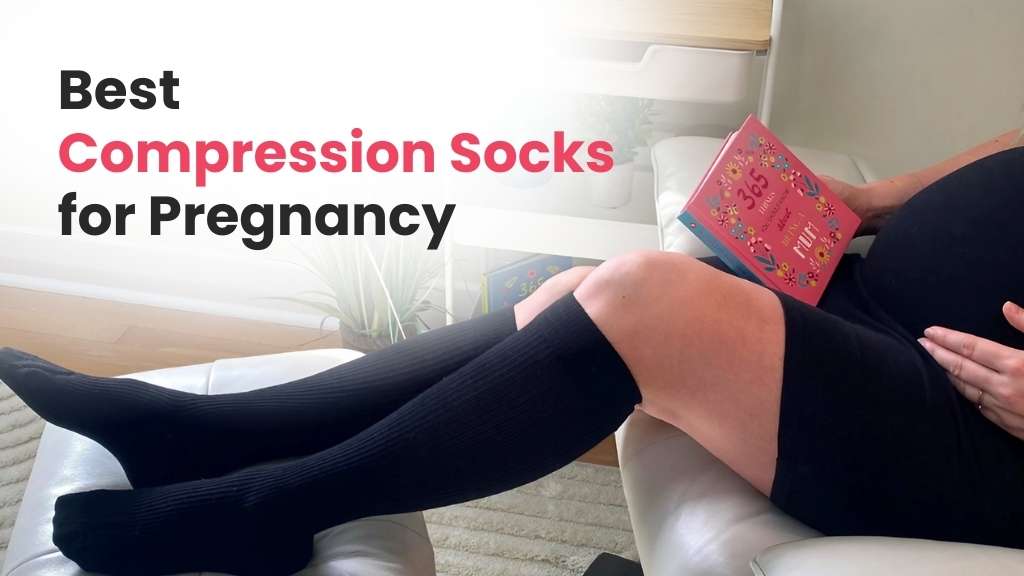
Table of Contents
Pregnancy is a beautiful journey, but it often comes with its share of discomforts, especially as the months progress. Swelling, achy legs, and the risk of circulatory issues can make this period challenging for expectant mothers. However, one simple solution that can significantly enhance comfort and well-being during pregnancy is the use of compression socks. These specially designed socks offer a range of benefits, from reducing swelling and relieving aches to promoting better circulation and minimizing the risk of conditions like deep vein thrombosis (DVT) and varicose veins.
In this guide, we’ll explore the best compression socks for pregnancy tailored to meet the unique needs of pregnant women. Whether you’re looking to ease discomfort, enhance circulation, or prevent common pregnancy-related issues, our selection of the best compression socks for pregnancy has got you covered.
Benefits of Wearing Compression Socks During Pregnancy
While compression socks may not be necessary early in pregnancy, they can offer significant advantages as you progress into the later stages of your second trimester and throughout the third trimester. Here are some benefits:
- Reducing Swelling: Pregnancy often leads to increased blood production, resulting in fluid retention and swelling. Compression socks gently squeeze the legs, reducing swelling and alleviating discomfort, especially if you’re on your feet for extended periods.
- Enhancing Circulation: Pregnancy hormones can increase the risk of blood clots and conditions like deep vein thrombosis (DVT). The pressure from growing uterine weight can also affect vein function. Compression socks aid in preventing blood from pooling in the lower extremities, reducing the risk of clot formation.
- Relieving Aches: Many expectant mothers experience leg soreness and discomfort as their pregnancy progresses. By promoting better circulation, compression socks can help alleviate these aches and pains.
- Minimizing Varicose Veins: Varicose veins, characterized by dark, swollen veins on the legs, are a common occurrence during pregnancy due to hormonal changes. Compression socks are designed to improve blood flow and can help minimize or prevent the development of varicose veins.
Wearing compression socks during the later stages of pregnancy can contribute to overall comfort and well-being.
9 Best Compression Socks for Pregnancy
1. Charmking Compression Socks
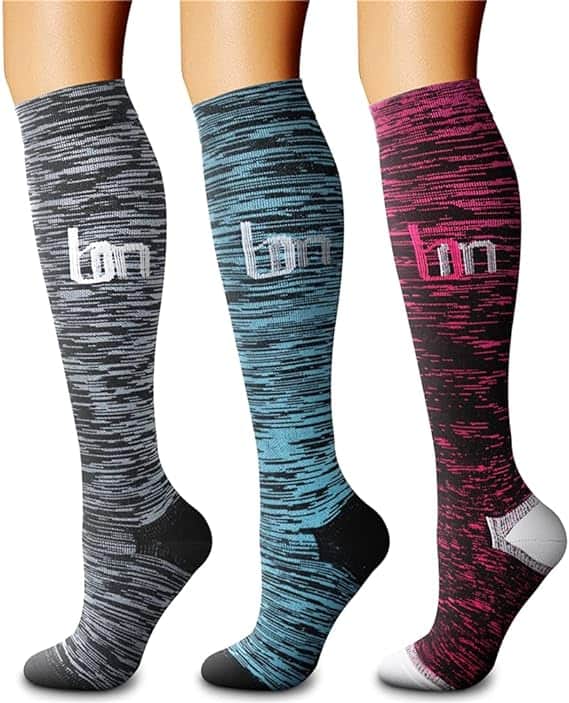
Material: Nylon
Compression Level: 15–20 mmHg
Sizes: Available in Small/Medium and Large/Extra Large
These compression socks are available in an economical three-pack and provide the recommended 15 to 20 mmHg compression. With a wide selection of patterns and colors, these socks allow you to maintain style even in your choice of compression wear.
Pros:
- Affordable pricing with a three-pack option
- Offers a diverse range of colors and patterns
- Available in two different sizes
Cons:
- Provides only one level of compression
2. Lemon Hero Zippered Compression Socks
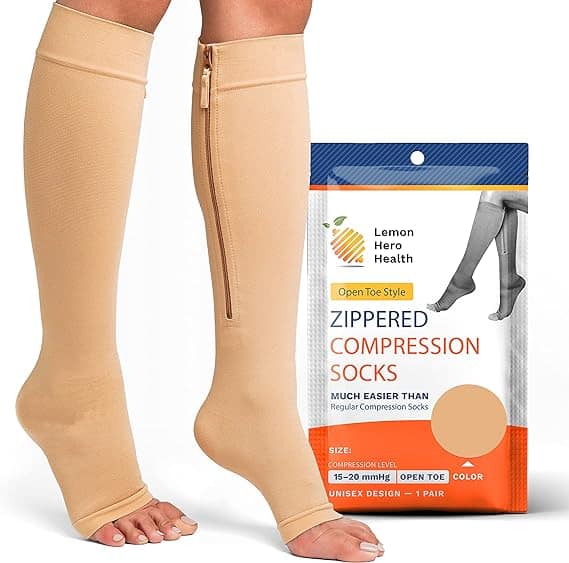
Materials: Spandex, Nylon, and Lycra
Pressure Levels: 15–20 mmHg or 20–30 mmHg
Sizes: Medium, Large, Extra Large, 2X, 3X, 4X, 5X
Lemon Hero presents a solution to the often challenging task of putting on compression socks with their innovative open-toe design featuring zippers. These socks are designed for convenience, allowing you to effortlessly slip your feet into them and zip them up, eliminating the need for rolling. They include a zip guard to protect against any pinching during the process.
Pros:
- Designed for easy wearability
- The zipper design ensures no leg pinching during wear
- Available in a wide range of sizes
Cons:
- Some individuals may not prefer the sensation of wearing open-toe socks
3. Comrad KneeHigh Compression Socks
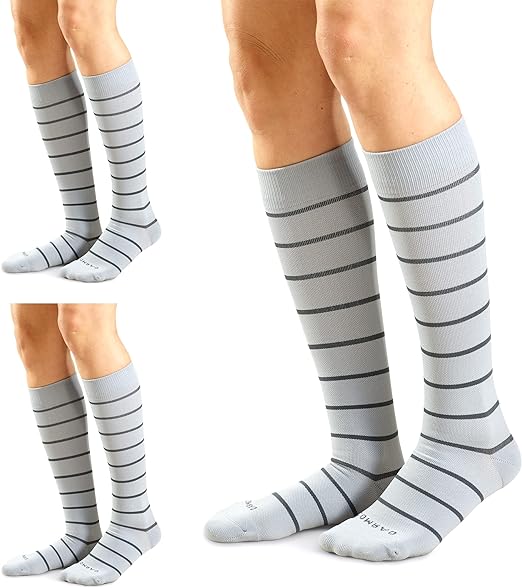
Material: Nylon (Some variants include recycled cotton and spandex)
Pressure Level: 20–30 mmHg
Sizes: Small, Medium, Large
Comrad offers knee-high compression socks in stylish colors and subtle patterns, allowing you to maintain a fashionable look while benefiting from compression wear. These socks are equipped with antimicrobial properties in the fabric to prevent odors, making them suitable for multiple wears without washing. For those prioritizing sustainability, Comrad also offers a line of compression socks made from recycled cotton.
Pros:
- Available in a variety of colors and subtle patterns
- Antimicrobial features help reduce odors
- Ecofriendly options with a line of socks made from recycled cotton
Cons:
Limited to striped patterns; solid-color sock enthusiasts may find them less appealing
4. FuelMeFoot Copper Compression Socks
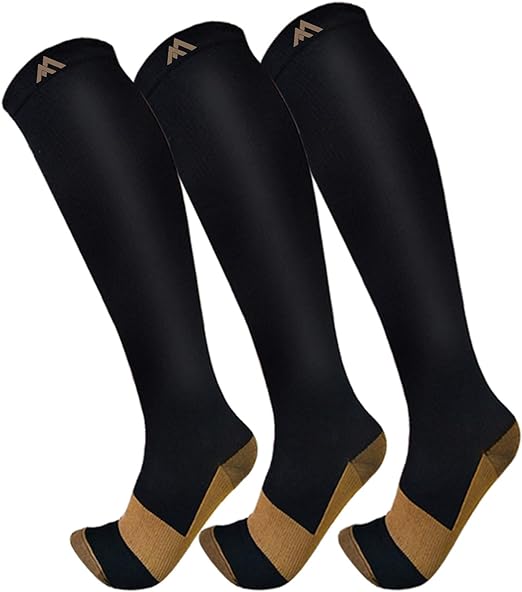
Materials: Nylon, Polyester, and Copper Fiber
Pressure Level: 15–20 mmHg
Sizes: Available in Small/Medium and Large/Extra Large
FuelMeFoot presents Copper Compression Socks that offer both style and effectiveness. You have the choice of classic black or bold prints, ensuring you don’t compromise on fashion. These knee-high socks provide mild compression and incorporate copper ions to combat odors.
Pros:
- Kneehigh design provides extensive coverage
- Copper ions included to reduce odor
- Stylish designs that stand out from typical pharmacy options
Cons:
- Available in only two sizes
5. Aoliks Compression Socks
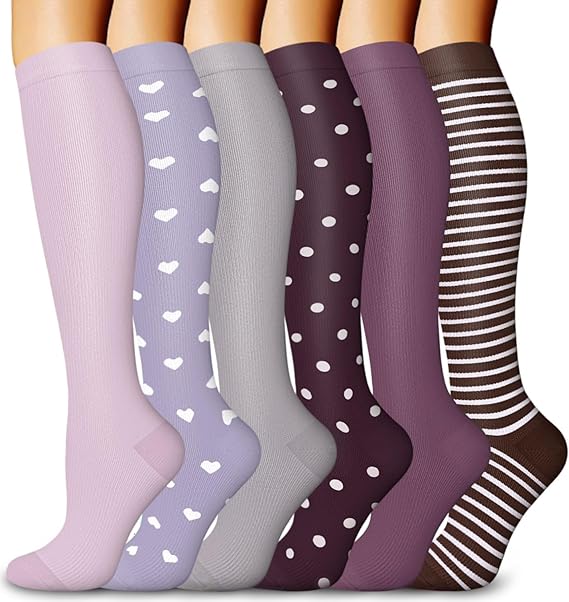
Materials: Nylon and Polyester
Pressure Level: 20–30 mmHg
Sizes: Available in Small/Medium and Large/Extra Large
Aoliks Compression Socks offer a blast from the past with three pairs of brightly patterned socks that embrace the ’80s vibe. These graduated compression socks provide 15 to 20 mmHg pressure while maintaining a lightweight weave, making them one of the best compression socks for pregnancy suitable for year-round wear and outdoor activities.
Pros:
- Lightweight weave suitable for all seasons and outdoor activities
- Available in a variety of fun patterns and prints
- Graduated compression for added comfort
Cons:
- The lightweight weave may feel thin in colder climates
6. VIM & VIGR Cotton Compression Socks
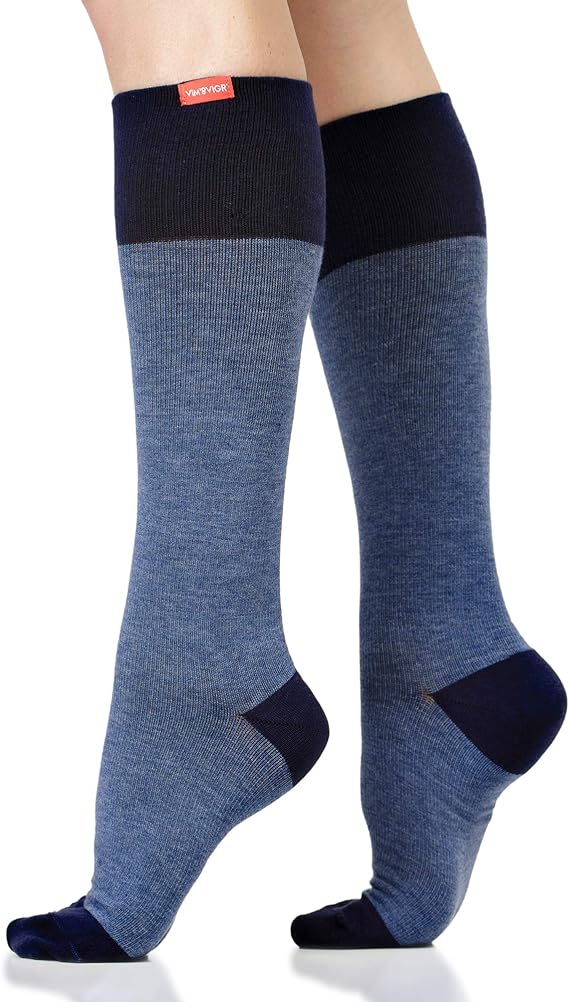
Materials: Cotton, Nylon, and Spandex
Pressure Level: 15–20 mmHg
Sizes: Available in Sizes 1, 2, 3, 4, 5 (Based on Calf Width)
VIM & VIGR’s Cotton Compression Socks, while the highest-priced option in our guide, offer exceptional comfort for everyday wear. These socks are easy to put on and come in a wide range of unique colors and patterns, including classic black. Additionally, VIM & VIGR offers medical-grade compression socks, developed in collaboration with vascular surgeons.
Pros:
- Available in various sizes to accommodate different calf widths
- Offer unique patterns and classic black options
- Easy to put on for added convenience
Cons:
- Considered the priciest option on our list
7. Dr. Scholl’s Compression Knee High Socks
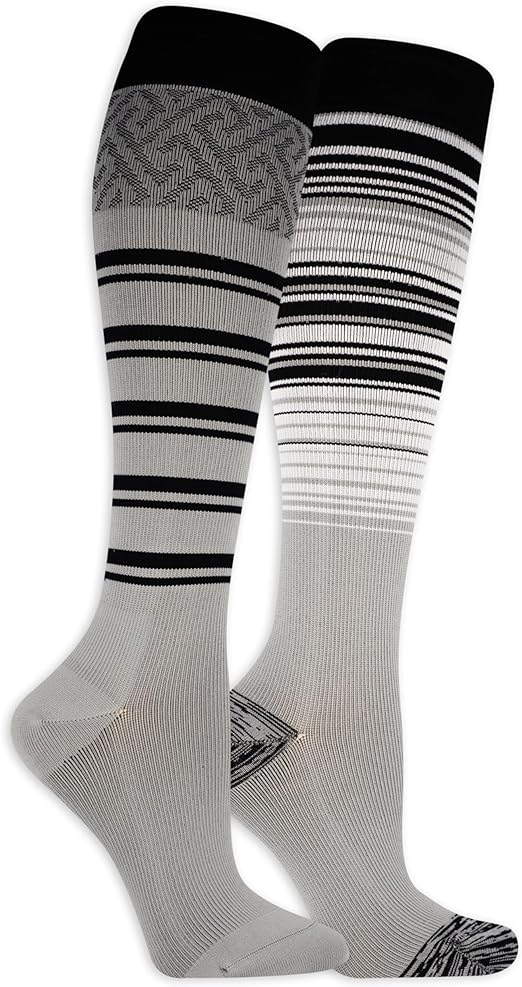
Compression: 815 mmHg
Materials: Polyester, nylon, spandex
Sizes: SM (Fits shoe sizes 411)
Colors: Available in 17 options
Dr. Scholl’s Women’s Graduated Compression Knee High Socks offer both style and therapeutic benefits. These knee-high compression socks for pregnancy provide graduated compression, which means they exert more pressure on the ankle and gradually decrease as they move up the leg. This design helps improve circulation and reduce swelling, making them ideal for long periods of standing or sitting.
Pros:
- Suitable for mild swelling, aches, and pains
- Affordable and available in multiple colors and patterns
- Thinner knit for less sweat and ideal for warm climates
- Breathable and comfortable for all-day wear
Cons:
- Sold singly or in multipacks with potential variation in designs
8. ProCompression Marathon Compression Socks
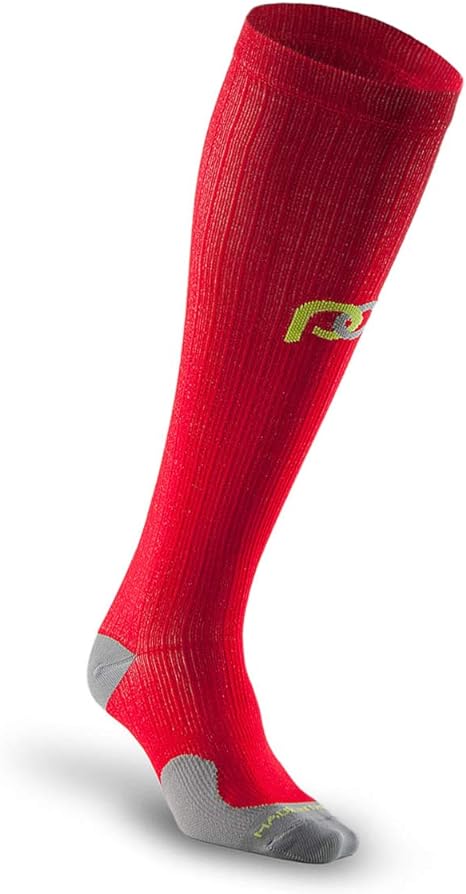
Compression Level: 2030 mmHg
Materials: Nylon, spandex
Sizes: XSXL (Fits shoe sizes 514, calves 1019 inches)
Colors: Available in an impressive variety of 61 colors and patterns
Pro’s Marathon compression socks are a cool and comfortable solution for pregnancy swelling. Made from a nylon and spandex blend, they offer superior moisture-wicking and airflow. These socks come in a wide range of 61 colors and patterns. With a compression level of 20 to 30 mmHg, they effectively manage swelling, but for milder cases, Pro’s PC Dress socks with 10 to 20 mmHg compression may be a better choice.
Pros:
- Designed to wick sweat and allow airflow, suitable for hot and sweaty conditions
- High quality compression socks ideal for long hours on feet
- Variety of colors and patterns to choose from
- Some styles are available in “wide calf” sizes for larger calves
Cons:
- The compression level is on the higher end, so may not be suitable for mild swelling
9. Pembrook Plus Size Compression Socks Wide Calf
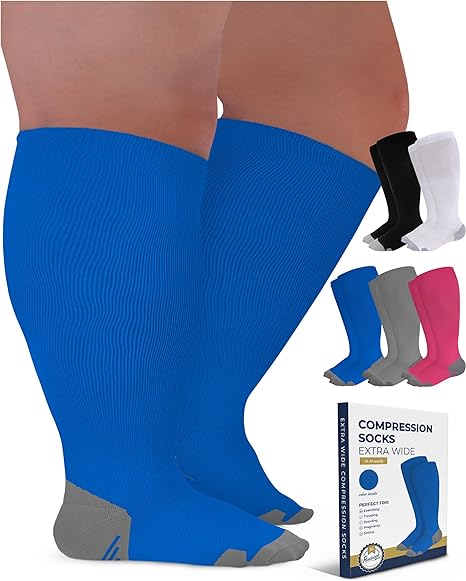
Compression Level: 2030 mmHg
Materials: Nylon, spandex
Sizes: XL6XL (Fits ankles 1116 inches, calves 1527 inches)
Colors: Available in 5 color options
Compression socks should provide a snug fit without causing discomfort. However, pregnant women wearing compression socks that are too small may experience the sensation of their legs and feet being constricted. Most standard compression sock brands cater to calves of approximately 20 inches or less, which can be a concern for individuals with wider calves. Fortunately, Pembrook offers plus-size options that extend up to 6X, accommodating ankles measuring up to 16 inches in diameter and calves of up to 27 inches.
Pros:
- Accommodates wider calves, ankles, and feet with sizes up to 6XL
- Provides firm support without uncomfortably squeezing feet
- A non-pinching band at the top of the socks that stays up
Cons:
- Thicker fabric may lead to increased heat and sweat, especially in hot weather
Concluding Thoughts on Compression Socks for Pregnancy
Finding the best compression socks for pregnancy can be a valuable investment in the comfort and well-being of expectant mothers. These specialized socks offer a range of benefits, from reducing swelling and improving circulation to relieving aches and minimizing varicose veins. While the right choice may vary depending on individual preferences and needs, there are excellent options available to support pregnant women throughout their second and third trimesters. Prioritizing comfort and health during pregnancy is essential, and compression socks can be a valuable addition to an expectant mother’s self-care routine.






